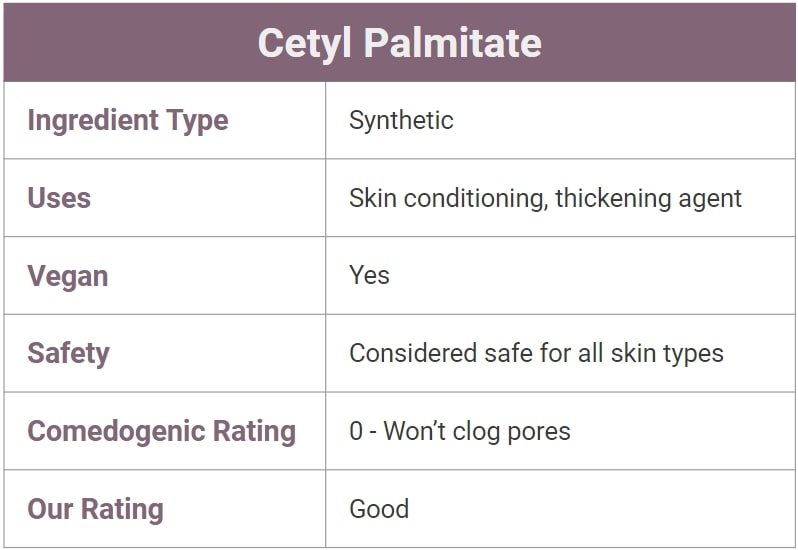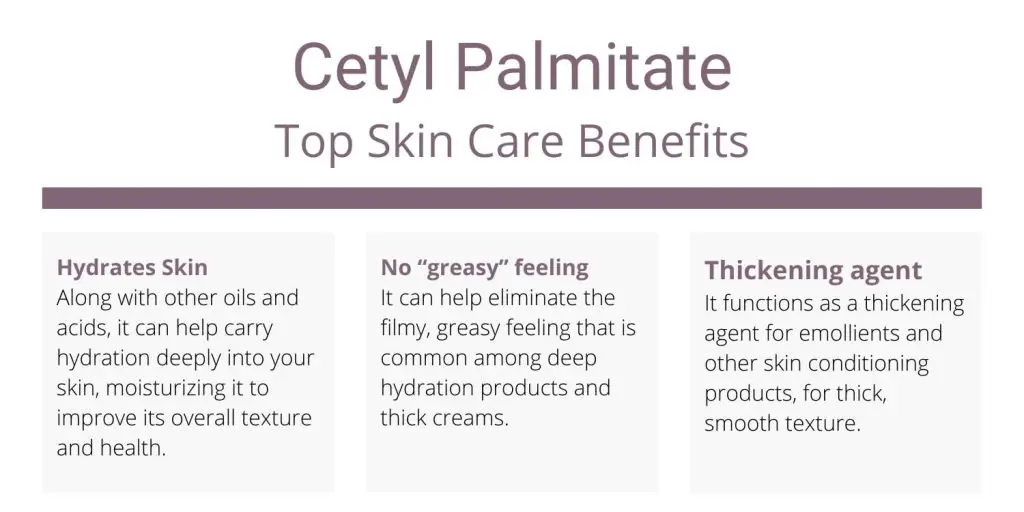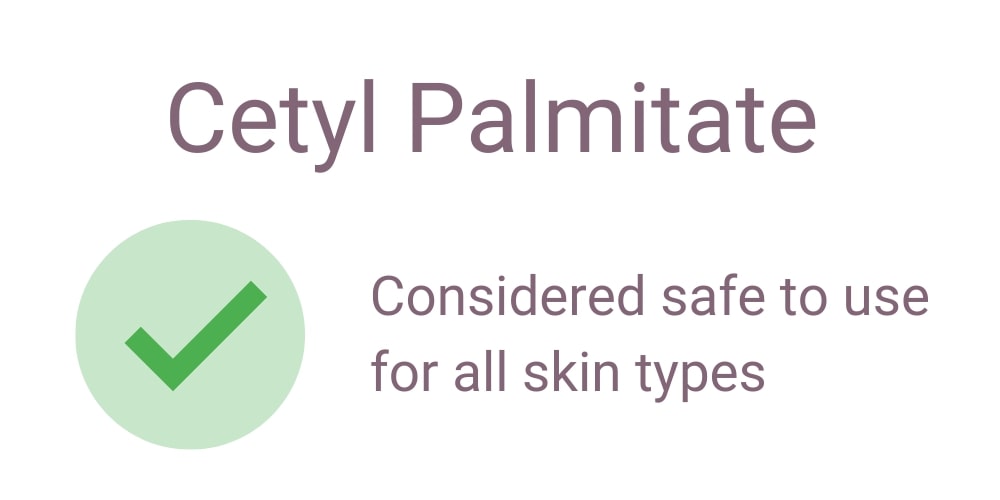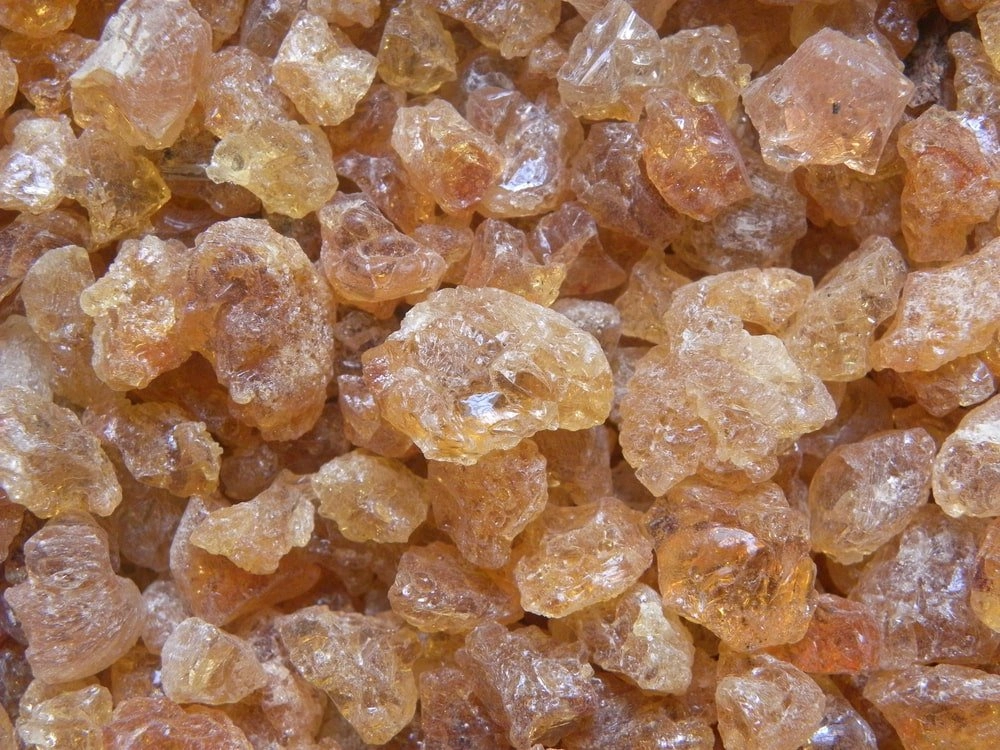Wondering what cetyl palmitate is and why it’s in your skincare products or cosmetics? You’ve come to the right place. We’ll help you understand what this compound is and why it’s used in skincare. Based on the name alone, this may sound like a scary or not-so-good ingredient. But that’s not the case!
This post may contain affiliate links. Read the full disclosure here
The good news is that cetyl palmitate is a good skincare ingredient. It offers moisturizing skin benefits and can also act as a thickening agent to give products their ideal viscosity. While it’s synthetically produced it’s considered a safe ingredient to use and it won’t clog your pores. Let’s dive in a little deeper.

What Is Cetyl Palmitate?
Cetyl palmitate is a fatty acid ester, meaning it’s made from the combination of a fatty acid with an alcohol. In its pure form, it’s typically found as white, waxy flakes, and it melts at a very low temperature of around 109° F.
This product is derived from the coconuts of palm trees and vegetable sources, which contain palmitic acid. This is combined with cetyl alcohol, which is also derived from palm trees, to create cetyl palmitate. This product is 100% plant-derived.
What Are The Uses & Benefits Of Cetyl Palmitate?
Now that we have a better idea of where cetyl palmitate comes from, you’re probably wondering why it is used in skincare and personal care products. It is a great texture enhancer for products (emulsifier and thickening agent) but it also offers direct benefits to the skin. These multi-purpose ingredients are what we like to see in skincare products.
When products have the right texture they are easier to use. This provides a more pleasant user experience but this can also help improve the effectiveness of the particular product.
So it’s great for product formulations but what skin benefits does cetyl palmitate offer? It’s also considered an emollient, an ingredient that helps moisturize, protect, and lubricates the skin. That’s right, this ingredient can help hydrate, soften, and condition the skin. On top of that, it’s also non-comedogenic so you don’t have to worry about it clogging your pores.
- Hydrate Skin – Cetyl palmitate, along with other oils and acids, can help carry hydration deeply into your skin, moisturizing it to improve its overall texture and health.
- No “greasy” feeling – Like other esters, cetyl palmitate helps eliminate the filmy, greasy feeling that is common among oily skincare products, and ensures proper absorption of creams and lotions into the skin.
- Thickening agent – Similar to other common esters like cetearyl olivate, cetyl palmitate functions as a thickening agent for emollients and other skin conditioning products, providing a thick and luxurious sensation when applying the product to the skin.
- Film Forming – Can help products form a film when applied to the skin. This can be effective for cosmetic products and sunscreen that need to stay on the skin to get desired results.
- Improve shelf-life – It has emulsifying properties that helps ingredients mix together and improve stability. This can help products from separating over time.

Cetyl palmitate can be found in a wide range of personal care products including moisturizers, lotions, deodorant , shampoos, lipstock, sunscreen, facial cleansers, and more.
Is Cetyl Palmitate Vegan?
Yes. While cetyl palmitate does naturally occur in some animals – sperm whales, for example – it is not harvested from any animal. In the past, it was primarily derived from sperm whales, but this is no longer an efficient, ethical, or cost-effective way of obtaining the ingredient, due to advances in modern manufacturing.
Today, cetyl palmitate is primarily made out of natural ingredients derived from palm trees, so it is completely vegan.
However, you should know that palm oil, which is what palmitic acid is derived from, has caused some environmental concerns related to the farming of palm trees and rainforest deforestation in countries like Indonesia.
If you wish to buy only “green” products, it may be worth avoiding products that contain cetyl palmitate, or to buy products derived from sustainable palm oil.
Is Cetyl Palmitate Safe In Skincare?
Yes, cetyl palmitate is considered safe to use in skincare and cosmetics. The Cosmetic Ingredient Review Expert Panel deemed this ingredient safe to use in currently used concentrations when formulated to be non irritating.
EWG Skin Deep also gave this ingredient a rating of 1 which is there safest rating based on risks associated with cancer, toxicity, and allergic reactions.

There are some reported cases of cetyl palmitate leading to irritation but these reactions are rare. Overall, this isn’t an ingredient you need to worry about!
Also Known As
Cetyl palmitate is also known as hexadecyl hexadecanoate, but this labeling is not commonly used in modern cosmetics and skincare labels. It may also be referred to as palmityl palmitate, hexadecyl ester, cetin, or Standamul 1616, among other names.
Related Ingredients You Might be Interested In:





